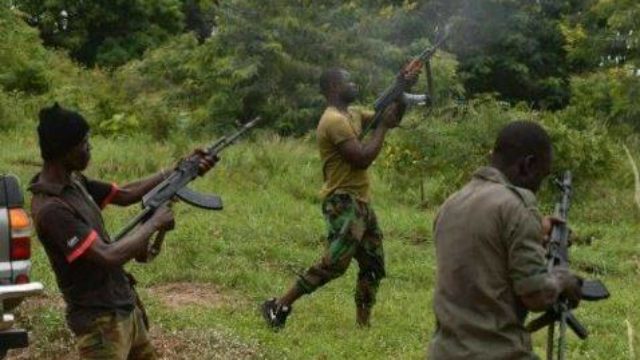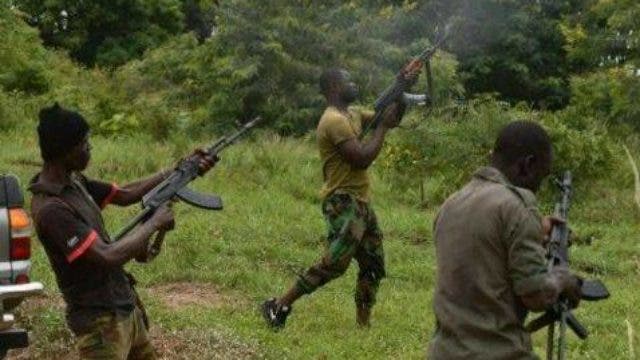
Parents of the 39 abducted students of Federal College of Forestry Mechanisation in Mando Igabi Local Government Area of Kaduna State, yesterday, appealed to the state governor, Nasir el-Rufai, to negotiate with the bandits and secure the release of their wards.
The governor had always insisted that his government would not negotiate with bandits, insisting that they needed to be completely routed by security agents.
The plea of parents of the kidnapped students came as bandits, suspected to be gang members of the late Terwase Agwaza, alias Gana, on Wednesday evening opened fire on traders at Abaji in Katsina-Ala Local Government Area of Benue State, killing one and injuring 13 others.
Two of the bandits were, however, killed by troops of the joint military operation, code-named Operation Whirl Stroke, OPWS, who was said to have responded to distress calls promptly.
Similarly, bandits in the early hours of yesterday killed nine persons in separate attacks in Birnin Gwari and Giwa local government areas of Kaduna State.
This is even as some Civil Society Organisations, CSOs, yesterday, opposed alleged payment of ransom by governments to bandits and kidnappers to free victims.
Abducted students still in captivity, 2 weeks after
Speaking yesterday on Channels Television’s breakfast program, Sunrise Daily, a member of staff of the college and representative of the parents, Sani Friday, expressed grave concern that two weeks after gunmen abducted the students, they were yet to be released.
It will be recalled that bandits attacked the school on March 12 and kidnapped 23 female, 16 male students, and later demanded N500 million ransom to free them.
He said the parents were afraid that the bandits might kill their children if the government used force.
Friday, whose two daughters were among the students in captivity, appealed to the state governor, Nasir El-Rufai, to adjust his no-payment-of-ransom stance to facilitate the release of the students.
He said: “It is this state governor who, sometimes ago, told the entire Kaduna State that if it costs him to pay bandits to stop killing citizens of Kaduna State, he will pay them.
“Now, the state government came out, even before the abduction of our students in the Federal College of Forestry, that it is wrong to negotiate with bandits and that he is not going to negotiate.
“After that statement, this incident happened and it is based on that statement that the government is standing that it will not negotiate. But he (El-Rufai) made a statement before that he can do anything for the bandits to stop killing, so we want him to do something.’’
Gunmen open fire on traders in Benue market
Similarly, two armed bandits dressed in military camouflage, said to be loyalists of the late militia leader, Terwase Agwaza, alias Gana, were on Wednesday reportedly killed in a gun battle with troops of the joint military operation code-named Operation Whirl Stroke, OPWS, at Abaji in Katsina-Ala Local Government Area of Benue State, hours after they opened fire on traders at Abaji market, killing one person and injuring 13 others.
Vanguard gathered that the troops of OPWS responded to a distress call from the market at the time of the attack.
A source said on getting to the scene, the attackers while beating a retreat engaged the soldiers in a shootout.
“It all started at about 4:30 to 5 pm on Wednesday when we started hearing sporadic gunshots at Abaji market and people ran for their lives.
“We quickly alerted troops of OPWS who responded promptly and came to repel the bandits. In the gun battle that ensued, the soldiers killed two of the bandits and recovered their AK47 rifle and much live ammunition but others escaped with bullet wounds.
“It was later discovered that one of the traders was killed by the bandits, while 13 others sustained bullet wounds but they were all rushed to hospitals in Katsina-Ala,’’ the source said.
When contacted, the Chairman of Katsina-Ala LGA, Mr. Alfred Atera, who confirmed the attack and the number of casualties, blamed it on loyalists of the late Gana who were demanding revenue from markets in Katsina-Ala LGA.
“They are Gana’s men, they do not want any market to operate in Katsina-Ala because, according to them, the past local government council chairmen were paying them revenue and that when I came in, I stopped giving them revenue, that is the problem.
“Only recently, they also attacked Tor Donga, and now they have attacked Abaji. They are out to attack markets.
“In this attack at Abaji market, they shot 14 persons and one died that yesterday, while 13 others are in hospitals. But the military went after them and gunned down two of them and recovered one AK47 rifle and live ammunition.
“I must commend the efforts of the military and the police. They are doing their best and we will continue to assist in any way possible and eventually, Katsina-Ala will be completely secured from the activities of these bandits,” the LG chairman said.
Confirming the attack, the Police Public Relations Officer, Deputy Superintendent, DSP, Catherine Anene, said the corpse of the dead had been deposited at the Primary Health Care Centre Abaji, while the injured persons were receiving treatment at the General Hospital Katsina-Ala.
“More patrol teams were immediately drafted to the scene to assist officers on the ground. Cordon and search operation is also in progress,” she added.
9 killed in two attacks in Kaduna
In a related attack, bandits killed nine persons in two local government areas of Kaduna State, Birnin-Gwari and Giwa, early yesterday.
The Commissioner for Internal Security and Home Affairs, Samuel Aruwan, who confirmed this, said bandits barricaded the Dogon Dawa-Kuyello road, after Ungwan Gajere village of Birnin Gwari LGA, and shot six people dead.
He identified the victims to include Nura Rufai, Sanusi Gajere, Yakubu Labbo, Usman Dangiwa, Alhaji Abdulhamid, and Janaidu Tsalhatu.
The commissioner said the bandits also killed two persons, identified as Haruna Dotu and Hamisu Mohammed, at Ungwan Maje, also of Birnin Gwari LGA.
According to him, one person, Nasiru Rufai, was killed by the bandits at Kwama village in Giwa LGA, after he resisted their attempts to kidnap him.
Reacting to the spate of kidnappings by bandits in the country yesterday, some civil society organization, CSOs, stated their opposition to payments of ransom to bandits by governments at all levels.
They argued that such ransoms would be deployed into acquisition of more deadly weapons by the bandits.
Payment of ransom is reward for criminality — Yiaga Africa
In his reaction, Programme Manager, Elections, Yiaga Africa, Paul James, said: “Payment of ransom is setting a bad precedent as it means governments are rewarding criminals for their heinous activities.
“As we may all have seen in recent times, payment of ransom, either by individual or by government, has only empowered bandits and terrorists to lead more heinous activities.
“Ransom payment has never been a good strategy as kidnappers will only use these proceeds to procure more arms to continue to attack innocent Nigerians. Thus, the country will continue to become unsafe especially for innocent citizens.
“The implication is an indication that the security agencies empowered to secure lives and properties may be indirectly telling Nigerians that they aren’t capable of protecting the citizens they swore to protect. This will breed even more criminals and even overwhelm the security agencies.
“Our security chiefs are not here for honeymoon. They have been in the system for decades so it is expected that they should hit the ground running. The incessant kidnapping, especially in schools, is not a good sign as Nigerians expected so much from the new service chiefs.
“We need to start asking the right questions around accountability and budget for Nigerian security architecture. Nigerians must start setting targets for their security agencies and failure to hit such targets should come with consequences.
“Intensify citizens’ intelligence gathering and build a cordial relationship between security and law abiding citizens. We also need to deploy technological devices to track down terrorists and prosecute accordingly. Nigeria needs to start setting examples by prosecuting bandits and their sponsors to forestall incessant insecurity.”
Ransom payment makes banditry lucrative, attractive industry —CN
In his reaction, the convener, Concerned Nigerians, Comrade Deju Adeyanju, said: “Governments are not doing anything really about the abductions and it has become an enabler of all the things going on in the country because they negotiate with bandits. Government pay them ransom as alleged by several people.
“The current insecurity in the country implies that it will distract investors from coming in, it will affect food production, it will lead to inflation and there’s a looming food crisis that we may soon be battling with in the country.
“On the issue of the new service chiefs, I don’t think they are bringing anything new to the table, they were part of the former regime of the former service chiefs. Based on all the things we have witnessed so far, I have not seen any new ideas from them.”
Ransom payment encourages more kidnapping and banditry—OLF
Founder, One Love Foundation, Chief Patrick Eholor, said: “It is sad and shameful that both the federal and state governments have always denied paying ransom, and yet they often do so.
“Remember, schoolboys and bandits involved in the Kankara abduction contradicted official denials that ransom was paid. Reports in some quarter suggest the Katsina State government paid ransom to recover the schoolboys.
“It is totally wrong for the government at any level including individuals to pay ransom to criminals.
“Payment of ransom will only encourage the crime of kidnappings and banditry in the country and across the Sahel which is becoming an extraordinarily lucrative enterprise.
“Countries like the United States and Italy, as a matter of policy, never pay ransom. The U.S. government had previously threatened to prosecute private individuals who seek to do so.
“The security chiefs met a highly bastardized and politicized architecture. They need to be given time to settle properly to restructuring and reviving the security sector thereby restoring the lost glory of the security sector.
“Finally, there can’t be security without properly funding the military and the police. It is all about funding and the welfare of the officers.
“We have heard of cases of misappropriation of funds meant for the purchase of weapons to secure the nation. No nation can be properly secured in a very corrupt environment.
“Therefore, we must fund the military and the police. Increase the salaries of our officers with better insurance and health care, purge corruption out of the system and deal with the issues of religious and tribal sentiments.”
Money paid as ransom should be used for weapon purchase —Shehu
The former National President of Miners Association of Nigeria, Sani Shehu, said: “It is unfortunate, if the allegation is right because such heinous act will flourish as an industry.
“Kidnapping is a punishable offense anywhere in the world and should be treated as such. Punishing kidnappers will serve as deterrent and can minimize the occurrences of such act in our society
“It weakens the security outfits and makes them less responsible and accountable. The ransom paid to bandits should have been used to acquire weapons and additional intelligence for our security operative.
“The new security chiefs are not Gods; yhey cannot change the situation automatically. They need to properly study the issues and re-strategize to be able to draw a road map that will bring an end to the problem in the nearest future. It is too early to appraise their performance
“The government should deploy more security to vulnerable schools and communities. The rumors that make the rounds said some VIPs are involved in the kidnapping and banditry should be investigated. Those found wanting should be brought to book, no matter how well placed they are.
“The government should use technology to identity and tract the flash points, and attack them as a preventive measure to stop kidnapping and banditry in Nigeria.”
Source: Vanguard







